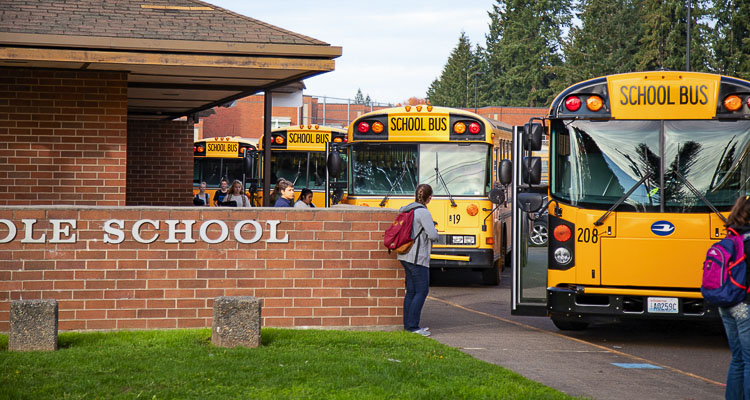
Exclusive: Joseph Farah reports on negative impact of federal involvement in education
Joseph Farah
WND News Center
Once upon a time, there was a wistful bliss and confidence about the American school system.
Before 2004 and something called the “No Child Left Behind” system in kindergarten through 12 became standardized, and before the beginning of the U.S. Department of Education, parents had a false sense of security about their children’s welfare.
But then better education became confused with bigger education.
Control of education became the purview of the federal government under President Jimmy Carter in 1979. This became even more stark with President George W. Bush taking office in 2001.
New polling results released by Gallup show that by 2004 more parents started expressing dissatisfaction with the one-size-fits-all systems being put into place in American schools.
Trust began to fall – sharply.
Americans became disillusioned – badly.
By 2019, only one-quarter – actually 28% – of us no longer trusted the public school systems.
Most of the time over the last 20 years those who have been unhappy with public schools have outnumbered those who like the system, roughly 54-44%.
It’s shocking that it happened that quickly.
The report explained, “The confidence Americans have in the United States public school system has fallen drastically and is currently close to the all-time low of 26% recorded in 2014.”
Only 28% said they have a great deal of confidence, or quite a lot of confidence, in schools.
“Trust has fallen sharply since the all-time high of 62% in 1975, though it briefly rebounded to 41% in 2020. In 2021, the rate of trust fell nearly 10 percentage points to 32%, and dropped again to 28% in 2022,” the poll reported.
The COVID-19 pandemic saw the closure of most schools in America for two years resulting in online education for many classes.
What that meant was that parents actually could hear and see what public school teachers were doing – and many justifiable objected to leftist indoctrination being delivered to their children.
That resulted in teachers trying, mostly unsuccessfully, to have parents banned from listening to or watching those classes along with their children.
“The poll illustrates the differing degrees of trust held by the country’s two major political parties,” Just the News commented. “Among Democrats, 43% say they have confidence in the school system, compared to just 14% of Republicans. The rate among independents is 29%.”
Developments in recent years have boosted dissatisfaction with Republicans, who have little faith in the leftist schools, where decisions often are made about curriculum and such by activists in the woke teachers’ unions.
“Republican faith in the public schools has nosedived in recent years. Since 2020, an 8-point gap between Republicans reporting their trust in the system as ‘very little/none’ and those reporting ‘a great deal/a lot’ of trust has widened into a 36-point gap,” the report said.
The survey also revealed 12% of respondents say their school-aged children have worried about safety in schools, 21% say racial segregation is very serious, and 53% say the government needs to address that.
The significance of a college education is declining, with only 53% saying it is very important today, down from 70% in 2013.
And while almost two-thirds like the ideas of free community colleges and free four-year universities, only a fraction believed the government would be able to pay the costs of those programs.
In 2021, Attorney General Merrick Garland all but declared that parents speaking up against some school policies had become “domestic terrorists.”
Under increasing pressure from Republicans who called on Garland to retract his directive, the attorney general clarified that the memorandum he issued is directed at “concerns about violence, threats of violence, other criminal conduct. signs $1 trillion infrastructure bill into law.
“That’s all it’s about. And all it asks is for federal law enforcement to consult with, meet with local law enforcement to assess the circumstances, strategize about what may or may not be necessary to provide federal assistance, if it is necessary,” he said.
The rest is history.
Now America is learning that bigger isn’t better when it comes to schooling. In fact, it’s downright dangerous.
Also read:
- Opinion: MAX costs and reduced service at TriMetA new opinion column from Rep. John Ley examines rising TriMet costs, declining ridership, proposed tax hikes, and the impact on Clark County’s transit future.
- Letter: Strengthening Medicaid for those in needCamas resident Anna Miller expresses concerns about Medicaid fraud, waste, and abuse, citing comments from Dr. Mehmet Oz and advocating for measures to prioritize those most in need.
- Letter: ‘Freedom is not free’Area resident Bob Zak reflects on the meaning of Memorial Day, the responsibilities of citizenship, and the importance of honoring military service members.
- POLL: Should fireworks be banned in unincorporated Clark County?Should fireworks be banned in unincorporated Clark County?
- Opinion: ‘I am absolutely disgusted by lawmakers and educators who have been successful in reducing parental rights’Clark County Today Editor Ken Vance voices concern over recent changes to parental rights legislation in Washington state and urges support for education alternatives.











Another local news source recently published the premilinary budget for the Camas School District for the upcoming school year. Care to guess how much of the multi-million dollar budget goes for employee wages?
88%… that’s right, 88%. And it’s probably close to that figure in many of the other districts in the county.
Is this a good investment on your tax dollars?